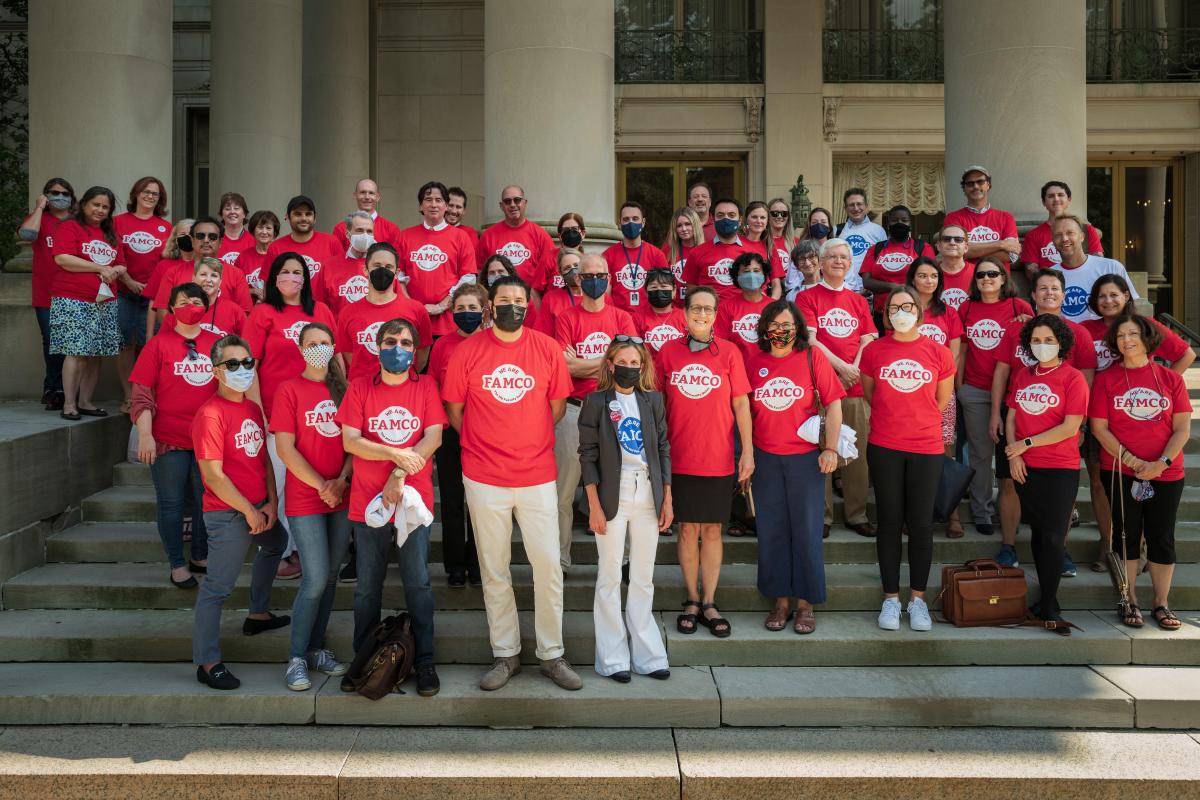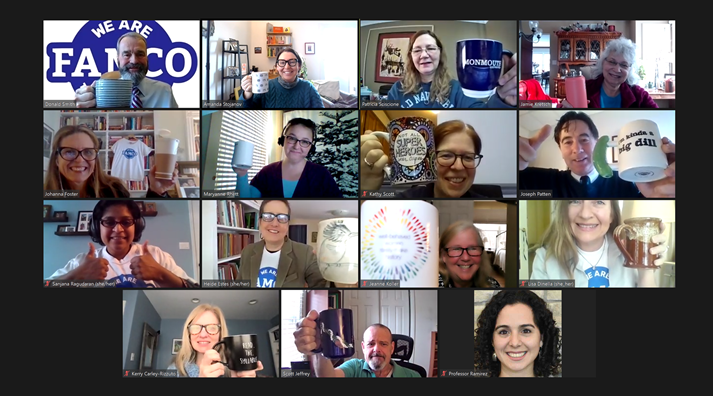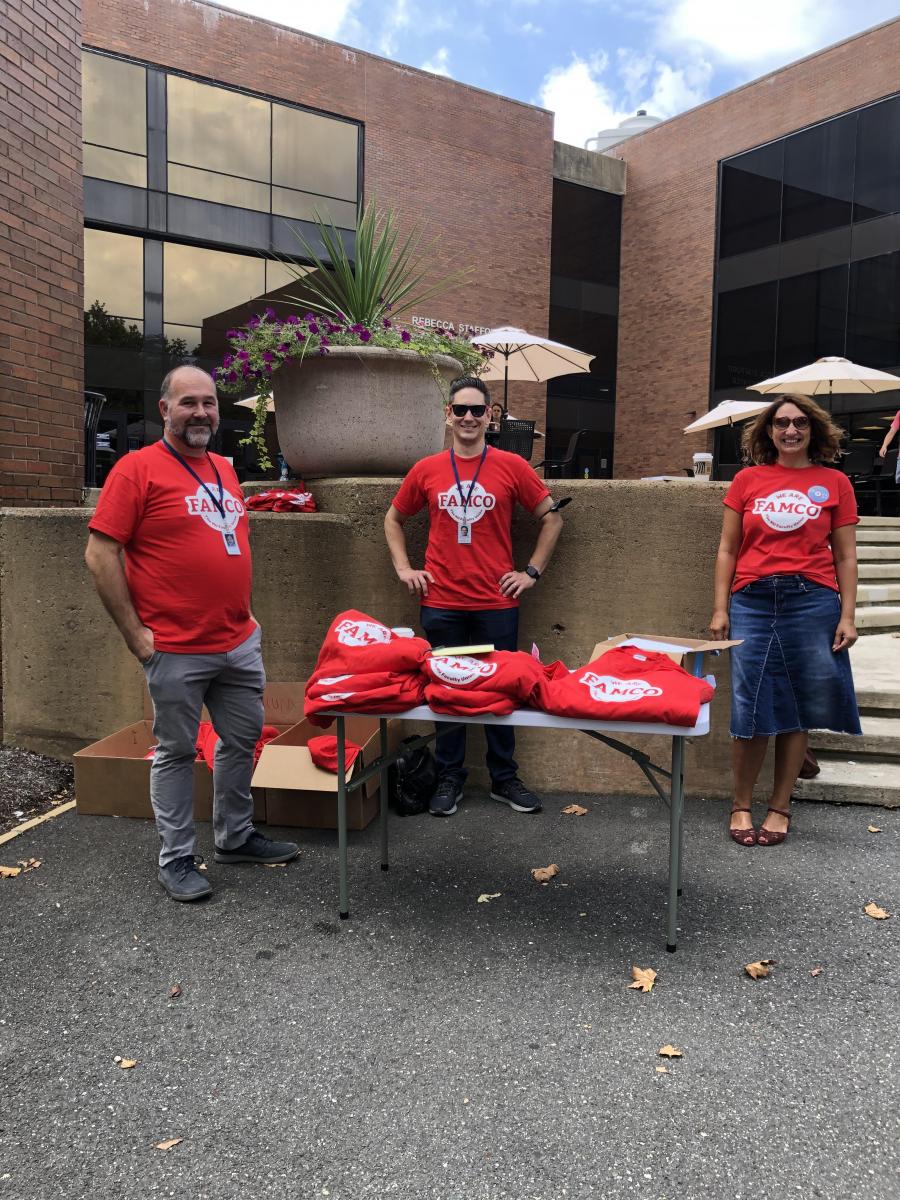 The Faculty Association of Monmouth University, known as FAMCO, is an AAUP collective bargaining chapter at Monmouth University (formerly Monmouth College) in West Long Branch, New Jersey. In 1960, Monmouth College became one of the first two institutions to be investigated by the AAUP’s Committee on College and University Governance for infringements of AAUP-supported governance standards. Monmouth’s AAUP chapter was chartered in 1971, and in 1979, the faculty went on a two-week strike over salaries that was covered in the New York Times.
The Faculty Association of Monmouth University, known as FAMCO, is an AAUP collective bargaining chapter at Monmouth University (formerly Monmouth College) in West Long Branch, New Jersey. In 1960, Monmouth College became one of the first two institutions to be investigated by the AAUP’s Committee on College and University Governance for infringements of AAUP-supported governance standards. Monmouth’s AAUP chapter was chartered in 1971, and in 1979, the faculty went on a two-week strike over salaries that was covered in the New York Times.
During its recent contract campaign, FAMCO successfully engaged a majority of members in member-led organizing. Last fall FAMCO members ratified a new three-year contract, winning significant across-the-board and salary-floor increases, a one-year freeze on health-care premiums, an agreement to conduct a third-party salary-equity study, faculty intellectual-property protections, and protections against the imposition of a “HyFlex” modality, which would have required faculty members to teach simultaneously both in-person and online versions of each course. The contract settlement follows sustained member organizing that had started two years earlier, when the chapter initiated a health-care issue campaign centered on regular labor–management committee meetings to discuss the health-care needs of faculty members and their families.
We learned more about FAMCO from president Johanna Foster, action team leader Sanjana Ragudaran, equity team leaders Lisa Dinella and Jen McGovern, and labor-management committee captain and former chair of the faculty council Marina Vujnovic.
Prior to the pandemic, you had already taken initial steps to redefine your chapter as a shared governance union, as opposed to a service or business union. What does this mean for FAMCO?
For us, it means pushing back on the notion that a union’s job is solely to file member grievances as the primary “service” provided in exchange for member dues. While protecting individual members through the grievance process is central to the work, a shared governance union has the larger goal of building the collective power of the faculty, protecting the professoriate itself, and promoting the common good more broadly. To do so also means to push back against the assumption that protecting the faculty role in determining the academic mission and addressing faculty working conditions are always and necessarily two distinct areas of struggle. As we see it, they are overlapping terrains where the faculty can and must build power together to protect the mission of higher education and democratic engagement more fundamentally. Shared governance unionism means making common cause not only with our faculty councils and senates but also with other employee unions on and off campus, with student groups, and with allies in the community to support a broader agenda of equity and social justice.
How has FAMCO worked to strengthen the relationship between the faculty council and the union?
When Marina became faculty council chair, she realized there was an unwritten rule that FAMCO should worry only about issues related to working conditions—as if academic issues did not also affect working conditions and vice versa. Together with FAMCO leaders, the faculty council and its leaders set out to change that view. Probably the best example of how we did this was a change in the bylaws of both leadership bodies that placed a nonvoting member of FAMCO on the faculty council and a nonvoting member of the faculty council in FAMCO. This change enabled better communication and coordination between the two bodies, following the best practices in shared governance. Two important results of this tightened relationship were the passage of a formal resolution against online program management corporations passed by the faculty council with the union’s support and the contract win protecting against the imposition of HyFlex teaching modalities at MU.
Which victories of your contract campaign mattered the most to members, and how have they made a difference in conditions for faculty and students at Monmouth?
Across-the-board salary increases mattered to our members. Without these salary increases, we would be looking at a virtual pay cut. Members feel that these increases were an amazing win considering the austerity measures being enacted across institutions of higher education. Not only do these numbers help faculty members plan for the future, but they show that the faculty’s contributions to the university are valued—which helps retain the best faculty members. In this time of the great resignation and high burnout, the actual and symbolic dollar value both mean a lot. When faculty members choose to stay put, our students win, too, as they can continue building relationships with people who have their best interests at heart.
Along with across-the-board raises, we were also able to raise the salary floors for faculty members in almost all the ranks and freeze health-care costs for the first year of the contract. Knowing that the health care of our members has been protected, and that costs can be contained for now, has been an enormous relief during the pandemic.
Are there lessons you have learned from organizing during a pandemic that might lead to longer-term changes in how you engage members and conduct chapter business?
 We needed to get innovative during the pandemic. Members were also seeking engagement, and we turned to Zoom for virtual meetings to support the contract campaign, including creative virtual gatherings we called “raise-a-mug” actions, where members turned out to support our bargaining team as they headed into negotiations. For the first time, we were also able to include our members virtually as observers during negotiations, and that proved to be a game-changer in our efforts to educate and agitate members as we pushed for a strong contract. We were also able to engage in virtual power-showing actions using Zoom profiles and backgrounds, where we displayed our union pride in inspiring numbers. This sense of connection was important and has carried through in our work with our departmental liaisons and our action teams. We know now that building power takes ongoing connection and engagement: having a communications system in place to reach people quickly and directly when issues arise is critical. We also moved to add a field organizer position to our executive team to create the structural space to do collective action work.
We needed to get innovative during the pandemic. Members were also seeking engagement, and we turned to Zoom for virtual meetings to support the contract campaign, including creative virtual gatherings we called “raise-a-mug” actions, where members turned out to support our bargaining team as they headed into negotiations. For the first time, we were also able to include our members virtually as observers during negotiations, and that proved to be a game-changer in our efforts to educate and agitate members as we pushed for a strong contract. We were also able to engage in virtual power-showing actions using Zoom profiles and backgrounds, where we displayed our union pride in inspiring numbers. This sense of connection was important and has carried through in our work with our departmental liaisons and our action teams. We know now that building power takes ongoing connection and engagement: having a communications system in place to reach people quickly and directly when issues arise is critical. We also moved to add a field organizer position to our executive team to create the structural space to do collective action work.
What does it mean to work for racial justice as a union?
Racial justice must be a cornerstone of union work. What serves the collective community sometimes means fighting for the people who have been excluded from that community. At Monmouth, we recognize that the egregiously low number of faculty members of color on our campus, particularly among those who hold tenure-track appointments, poses a threat to the health of our community. This led us to initiate an equity campaign to require all new faculty applicants to submit a statement outlining their qualifications to contribute to the university’s diversity mission, to propose new mechanisms to increase racial diversity in all faculty applicant pools, and to promote a more racially and ethnically diverse faculty through cluster hiring.
What are the current and most urgent priorities for FAMCO?
 We will continue to push for health-care plan choice, out-of-network benefits for all our members, and plan affordability in the year ahead—a campaign that is allowing us the great opportunity to work in coalition with staff unions. Also urgent for us is moving forward on our proposals to ensure racially diverse hiring pools, protecting our clinical faculty from unfair workloads, and the related fight for gender salary equity. While the across-the-board salary increases were great, there are still huge salary inequities based on gender and race. FAMCO and the administration agree that gender equity is a priority, but we don’t see eye to eye on where the disparities exist and the best way to confront them. We know that occupational gender segregation is a key determinant of gender salary inequities in many fields, for example, and our goal is to ensure that our faculty in “feminized” disciplines at MU, regardless of their gender, are compensated equitably.
We will continue to push for health-care plan choice, out-of-network benefits for all our members, and plan affordability in the year ahead—a campaign that is allowing us the great opportunity to work in coalition with staff unions. Also urgent for us is moving forward on our proposals to ensure racially diverse hiring pools, protecting our clinical faculty from unfair workloads, and the related fight for gender salary equity. While the across-the-board salary increases were great, there are still huge salary inequities based on gender and race. FAMCO and the administration agree that gender equity is a priority, but we don’t see eye to eye on where the disparities exist and the best way to confront them. We know that occupational gender segregation is a key determinant of gender salary inequities in many fields, for example, and our goal is to ensure that our faculty in “feminized” disciplines at MU, regardless of their gender, are compensated equitably.
We found it interesting to learn that Monmouth College was one of the first two institutions that the AAUP investigated for shared governance violations, as a growing concern among our members has been the increasing need to defend against a set of very serious threats to the principles and practices of faculty governance at MU, which has made us that much more resolute in our pursuit of shared governance unionism.
Pictured:
1. FAMCO members gathered prior to ratifying their last contract. Credit: Mark Ludak.
2. Example of FAMCO's regular "raise-a-mug" Zoom toasts to their labor-management negotiating teams as they entered into negotiating sessions.
3. Members handing out T-shirts in advance of an action during contract negotiations. From left to right, Dickie Cox (Communication); Patrick Love (English); and Marina Vujnovic (Communication).



